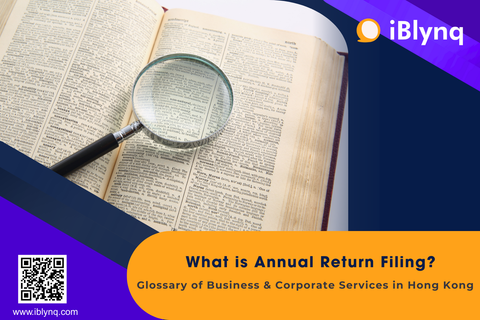Severance Pay Guide in Hong Kong 2025
Published: 20 May, 2025 | Updated: 1 Aug, 2025
When companies in Hong Kong face tough times and jobs are cut, it's important to know about severance pay (遣散費). This is money your employer might have to give you if you lose your job under certain conditions.
And, even if you get severance pay, there are still some important things to know, like whether you need to pay taxes on it and if it counts towards your retirement savings.
To help with this, iBlynq has created a complete guide, explaining what severance pay is, who qualifies for it, how it's figured out, and when you should get it.
We'll also cover what you can do if you think you deserve severance pay but haven't received it, along with some related tax considerations.
What is Severance Pay?
In simple terms, severance pay is the money that employers must pay you when they end your contract under certain conditions. This usually happens when the company is having financial trouble, reducing staff, closing down, or when your contract is not renewed after it ends.
When an employee leaves the company and receives severance pay, employers are generally required to report the departure to the IRD using the IR56F form. For a full overview of how these payouts fit into annual filing obligations, read our Complete Guide to Company Tax Filing in Hong Kong 2025.
Conditions to Qualify for Severance Payment
According to the Employment Ordinance, Chapter 57 in Hong Kong, to qualify for severance pay, employees must meet the following conditions:
- Worked for the company for at least 24 months, whether on a continuous or fixed-term contract.
-
Terminated, suspended or not renewed by the company for reasons such as:
- Company downsizing or restructuring.
- Company relocation or closure.
- Your original position being eliminated. - Not being fired for personal performance issues or misconduct.
Situations Where You Do Not Qualify for Severance Payment
- You resign voluntarily.
- You are dismissed immediately (for example, due to fraud, dishonesty or willful disobedience).
-
You signed a short-term contract (for example, less than two years).
How to Calculate Severance Pay
The calculation of severance pay depends on factors such as length of service, whether the employee is paid monthly or daily, and if the income is fixed.
The monthly wage cap for calculating severance pay is $22,500, while the maximum amount of severance pay that can be received is $390,000. Here is a quick example:
Calculation Formula:
2/3 × Relevant Wages × Years of Service
Example:
Peter has a fixed monthly salary of $27,000 and worked for the company for 5 years.
Severance Pay:
= $27,000 × ⅔ × 5
= $22,500 × ⅔ × 5 [use $22,500, as $27,000 exceeds $22,500]
= $75,000
In fact, the exact calculation also depends on whether you are monthly-rated or daily-rated, and whether the abolition of MPF Offsetting Arrangement would affect your severance pay. For a detailed step-by-step guide and examples, check out our full article on How to Calculate Severance Pay in Hong Kong.
For a quick and personalized estimate, use our Severance Pay Calculator and find out your approximate entitlement instantly.
Deadline for Employers to Settle Severance Payment
By law, employers are required to pay severance pay to employees as soon as possible. However, the Employment Ordinance states that employers must pay severance pay within 2 months after receiving a written claim from the employee.
If an employer deliberately and without a valid reason fails to pay severance compensation on time, they can be prosecuted and face a fine of up to $350,000 and possible imprisonment for 3 years.
Do You Have to Pay Taxes on Severance Pay?
Severance payment is considered compensation rather than work income, and is paid to employees according to the Employment Ordinance, so it is generally not taxable.
However, if the amount exceeds your legal entitlement (for example, if the employer gives you an extra amount), both the employer and employee must report that excess amount.
If the employer treats severance pay as a bonus (such as paying it under the name of a performance bonus), it may be considered taxable income. It's also worth noting that pay in lieu of notice (compensation for not giving notice) is taxable.
Do You Have to Contribute to MPF from Severance Pay?
MPF contributions only apply to "wage-type" income. Since severance pay is a one-time compensation and not considered salary, employees generally do not need to contribute to the MPF from it.
Difference Between Severance Pay and Long Service Payment
Many workers confuse severance pay with long service payment, but you cannot receive both at the same time.
In simple terms, severance pay is given mainly when you are laid off or the company closes.
Long service payment is for employees who have worked for the same employer for 5 continuous years and leave for reasons other than resignation (such as retirement due to age or being permanently unable to perform the job). If you qualify for both, you can only receive one.
How to Claim Severance Pay
If you suspect your company is delaying payment or not paying severance pay as required, you can take the following steps depending on the circumstances.
Within 3 months of being laid off, send a written "Notice of Claim for Severance Pay" to the company. The employer must pay the severance pay within 2 months of receiving the notice.
It's a good idea to keep any related documents, emails and WhatsApp messages before sending the notice.
You can also file a complaint with the Labor Department by calling 2717 1771 for inquiries.
If negotiations fail, you can file a claim with the Labor Tribunal, but this must be done within 6 months. You should call the 24-hour Telephone Appointment Booking System of the Labour Tribunal at 2625 0056 or visit the Judiciary's website to make an appointment to file the claim.
If the company is in liquidation, you can apply for a claim through the Official Receiver’s Office.
Big Change for Severance Pay in Hong Kong (May 2025)
If you lose your job in Hong Kong due to redundancy or layoff and have been working for at least two years, you’re entitled to severance pay.
How it used to work (before May 1, 2025):
Employers could use the money they had already put into your MPF (Mandatory Provident Fund) to “offset” part of your severance pay.
For example:
If you were entitled to $60,000 severance and your employer had contributed $25,000 into MPF, they only paid $35,000 in cash. This often left employees walking away with less money than expected.
What’s changed (from May 1, 2025):
Employers can no longer offset severance pay using MPF.
Using the same example, from May 2025 your employer must pay the full $60,000 in cash plus you keep your entire MPF balance.
Frequently Asked Questions
1. What does "suspension of work" mean?
If an employee has no work for more than the following days (not counting rest days, annual leave, or public holidays), it will be considered a suspension of work:
- More than half of the total working days in any continuous 4-week period
- More than one-third of the total working days in any continuous 26-week period
2. Do domestic workers receive severance pay or long service payment?
No, they do not.
3. If an employee has been employed for 5 years, do they receive both severance pay and long service payment upon dismissal?
If the employee is laid off, they can receive severance pay but cannot receive long service payment at the same time.
iBlynq is here to help
For employers, accurately calculating severance pay can help avoid legal disputes and ensure the business operates smoothly and legally.
We’re here to help you comply with payroll management and other employment matters with ease.
Based in Hong Kong, we offer a range of business services to support your business, including accounting and tax consulting, company registration, payroll management and company secretary services and more.
Let us take care of the details so you can focus on what you do best!






